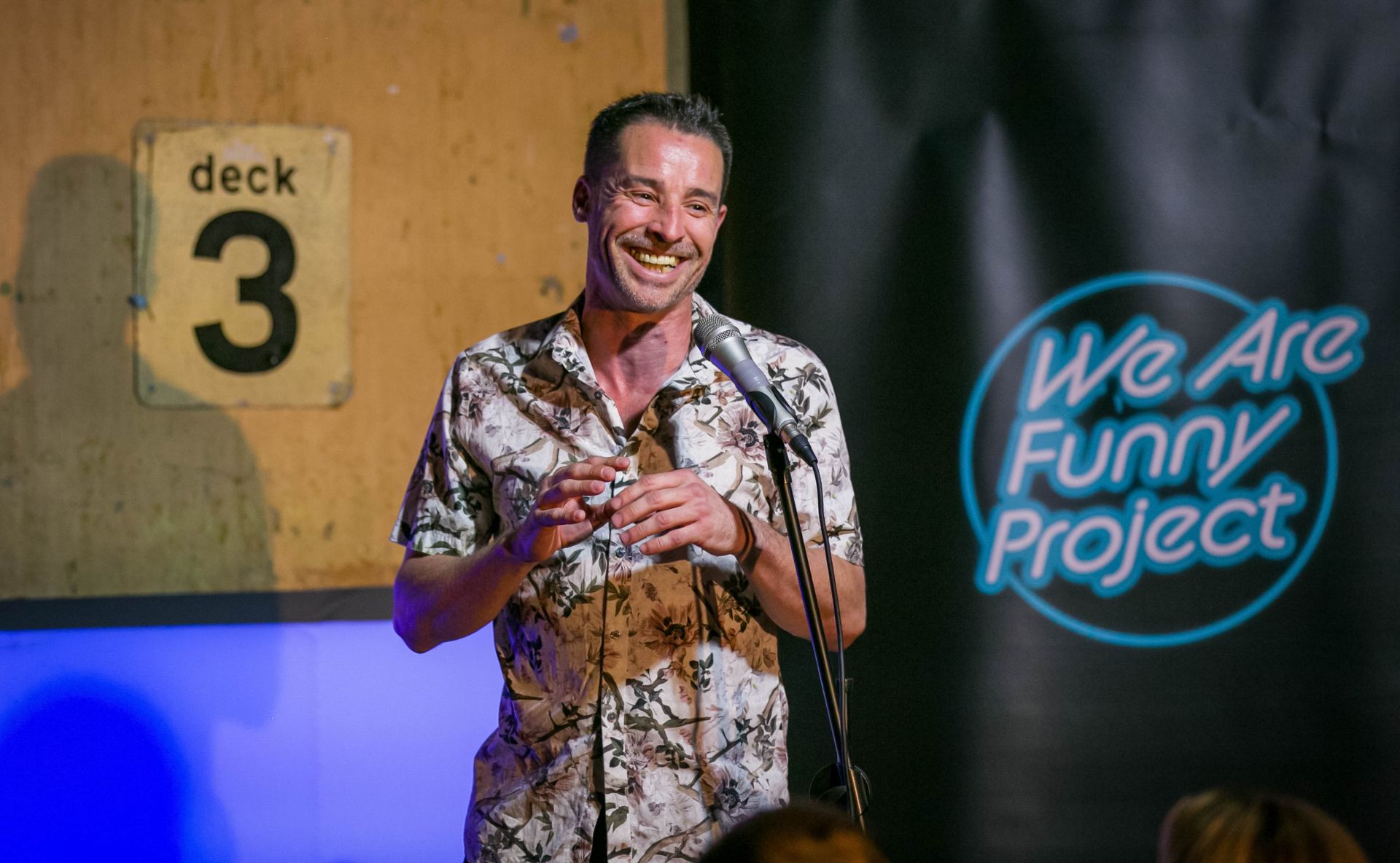Some Key Ingredients for a Quality Stand-Up Comedy Show

When I started
running open mic comedy gigs, I had no experience in the world of stand-up. Beyond
being a keen fan and regular punter.
Now, more
than a decade later I have come to realise that there are essential ingredients
for producing a good show. To ensure the acts feel supported.
For me, possibly
more important than any other “touchstone”, is my notion that a comedy open mic
should be “a safe place to fail and a great place to succeed”.
Certainly,
the bill of any gig ought to be a blend of brand-new acts alongside more
seasoned comedians, with proven comedy chops. It can be that an act with just 5
gigs under their belt is genuinely funny and gets regular laughs. Though
unlikely.
However, every new act needs the stage time so that they can get better. As ever, the road to improvement is the all-important stage time/minutes backed up by regular experimenting and practise.
Putting on
an entire bill, of say, 12 acts, all with fewer than a dozen gigs would almost
certainly be a dreadful show on account of the lack of quality.
Therefore, a
minority of acts on my bill would be “new” and are thus given opportunities to
learn and impress. The majority will be that much more experienced, likely
known to me already, confident that they will raise the laughter rate and help
the show be a good ‘un.
Some of the “seasoned”
acts may well be working out a lot of new material, and regardless of
experience, new material is always hard to judge. Until it’s in front of an audience
who will literally judge it, by laughing, or not.
Even if the
new material from a seasoned act goes well, it’s still just a first incarnation.
These freshest jokes will need working, editing, polishing and all the rest.
The aim of the comedian is to finally get the bits in their best shape and optimised
for comedy effectiveness.
I do not
believe that an open mic gig should be any kind of “safe space” for the
audience. The punters come in, fully aware that they are to watch a varied and
typically amateur stand-up show. They almost certainly did not pay an entry
fee, so their rights to complain are surely diminished.
Quality promoters
and MCs work tirelessly to make the show as welcoming as possible for acts and
audience. At the end of the day, I feel a greater concern for the acts.
After all, comedians
are the ones who have come up with a premise, written it up, edited it down,
rehearsed it, memorised it, travelled across town to perform. The acts risk scary
measures of their self-esteem to try and make a room of strangers laugh.
If I can
allow myself to be a tad glib here. That is rather more commitment than an
audience member who “just popped in”.
If someone
goes to a paid show, then they can rightfully expect a high quality of professional
acts. On a bill of 3, it could be that they do not like one of the performers
as matter of personal taste, yet don’t stop laughing throughout the other 2
comedians. That’s a lot of laughter, entertainment and value.
On an open
mic show it’s more of a rollercoaster with the lows being lower. The highs,
perhaps, being equal to the professionals. Though only able to sustain in a
shorter set.
With the stakes being so much lower, a significant silver lining is that the comedians are more liberated than they ever will be, to experiment and try things out.
With
typically just 5 minutes on stage, even the worst crash should not be enough to
derail the entire night (though I have seen it once or twice). My assessment is
about 99.9% of acts who die on stage were legitimately aiming to generate
laughter, and not merely trying to cause offence.
Many
comedians want to “play to the edges”. Test where the boundaries are. They wish
to assess audience reactions not just to actual punchlines, but to themes and
social topics.
How is a new
generation of future genius talent supposed to “find the line” without
sometimes “crossing the line”?
The answer
is, they cannot.
For those
who want to go “there” it’s a tough and lengthy exercise in calibrating a topic,
the mood, and the audience.
Think of some
of your favourite ever professional comedians.
If any of
the “legend” names such as Dave Chapelle, Alexei Sayle, Bill Burr, George Carlin,
Bill Hicks, Richard Pryor, Jerry Sadowitz, etc are on your list then please
consider some version of the young “them” starting out.
Imagine the sweat and tears endured over years, as they are
figuring out what they wish to address. Testing which unique angle(s) they will
take. Learning how to get more and bigger laughs.
It is
unavoidable for an act to try and map those territories without failing
relentlessly. Until succeeding spectacularly. Stand-up comedy can be a brutal
muse.
The open mic
room costs the audience nothing to enter. Certainly, we should cherish our
audiences. Were it not for these wonderful people and the potential laughter
they bring, stand-up has debatable value.
The “Boogey-man”
of comedy is the vicious, hateful, bitter performer who attacks (fill in the
target of your choice).
Thankfully,
we grown-ups know that the “Boogey-man” does not really exist.
Remember my stated
ethos of making my room “a safe place to fail and a great place to succeed”.
Unless I get
a clear sense that the person on-stage is more interested in being offensive,
rather being funny, I am broadly inclined to let them run. Hell, I am even inclined
to protect them.
Certainly, when
I re-take the stage and control of the PA, I can publicly address what just
happened if I need to. However, there is, as with so many experiences of being
in error, a built-in penalty for the perpetrator.
In this case,
I’m talking of the instant feedback loop that is the audience.
An act who
spends their full 5 minutes (or however long they have) jamming away at the
worst and darkest societal topics, sans punchlines, to utter silence and evident
revulsion, will typically endure a sense of failure and shame.
Failure and
shame are good motivators to move “away” from certain behaviours. Or at very
least, seek to adapt and improve said behaviours.
Get posts like this by email
The act may not
have the awareness to understand that they were nowhere near getting a laugh. Perhaps
they merely speak on a dark topic rather than try and approach it from a unique
angle. Maybe they evidently take glee in the dis-comfort of the crowd and
getting laughs was never the true aim… well, screw these non-comedians. All 8
of them.
Such folk
are not sincerely seeking the laughs. Nor are they investigating fresh and untrammelled
ideas. These are not impassioned artists willing to take the knocks en route to
some later success. They are in fact, arseholes.
They are
also, extraordinarily rare.
Further,
they are extremely easily dealt with.
Over the
years, I have provided stage time for over 8000 people. The number of acts who
fall into this “arsehole” description is, literally, in the single digits.
Here’s what
happened on the ultra-rare occasions this has been an issue. The audience made
it clear they did not like the material. I assessed the intent of the performer
to outrage rather seek to gain honest laughter. I then rinsed them when I
returned as MC. Then, I never booked them again.
Hell, many
of us promoters are friends and often enough provide a “heads up” if an act
causes notable problems in one form another. It’s rare, but that network exists,
and each promoter makes up their own mind whether to give the act a(nother)
chance.
Such acts are the teeniest minority of performers, extreme outliers that never get to stay in the scene for long. No one stays in the open mic scene for long if their bad faith and lack of skill is utterly self-evident.
Most of us
understand that we now live in a society riddled with faux, and sincere,
outrage.
It remains
so important to understand the difference between the “arseholes” and those newer
comedians who represent “undeveloped potential”.
There’s a
certain feeling of danger in an open mic room that most often really is not
available in a pro room. For the pros have learned (much at open mic level)
what will and will not fly.
It can be
utterly thrilling watching a newer act fail to understand what they “should not
do” and against the odds, succeed.
On a level
closer to the “can’t stop watching the car crash” mentality that is so common
among us humans, it is also quite the spectacle to watch them try what they “should
not do” and fail.
The fascination remains as I get to watch them come back, having tweaked some, and try again, over and over. Until finally proving that one can indeed make a “silk purse” from, well, something ugly.
I urge
promoters and MCs to ensure the performers have every chance to succeed,
appropriately rewarded with laughter and further opportunities.
The
essentials are to ensure the performers will be clearly visible with a stage
that everyone. Along with effective lighting and a decent P.A. to ensure that
the spoken words are perfectly audible.
A good room will have enough “real audience”
for the laughs to fly when the “punches” land.
A well-managed
show will run on time, to schedule, with appropriate breaks for the audience to
refresh themselves. Ready for more laughter.
Quite
obviously, the lynchpin of a show is the MC. If the host cannot manage the
basics, warm up the room, communicate with the crowd, keep everything moving
and elicit some laughs of their own, then it’s going to be a loooong night for
everyone.
An MC who
mocks an act who has crashed, unless that performer is the most egregious type
of “arsehole”, is quite simply a very bad compere indeed.
Promoters
and MCs, I urge you to make it so there is a soft landing for when a comedian
fails. It’s not a good thing to kick someone when they are down, when they have
tried in good faith. They already “got” the lesson via the audience reaction.
In stand-up,
regular failure comes before regular success.
“A safe place to fail and a great place to succeed” is an approach that serves everyone, audience, and most especially, the comedians.
Please feel welcomed to Subscribe to the We Are Funny Project YouTube channel.
There is a broad array of comedy education, interviews and plain weird and funny performance videos there. All for you.
Photos courtesy of Steve Best at https://www.stevebest.com/ and Gary Manhine at https://www.garymanhine.com/
Online classes for comedians at every level of experience
Learn and practise with the most talented comedians
Free open mic comedy, with top quality headline comedians
For stand-up comedians
For creative agency teams
Stand-up skill set. Stand-out results
Small print
Contact
We Are Funny Project Limited, 61 Bridge Street, Kington, HR5 3DJ, is registered in England and Wales, company number 08537398.
Copyright © We Are Funny Project Limited. All rights reserved.

